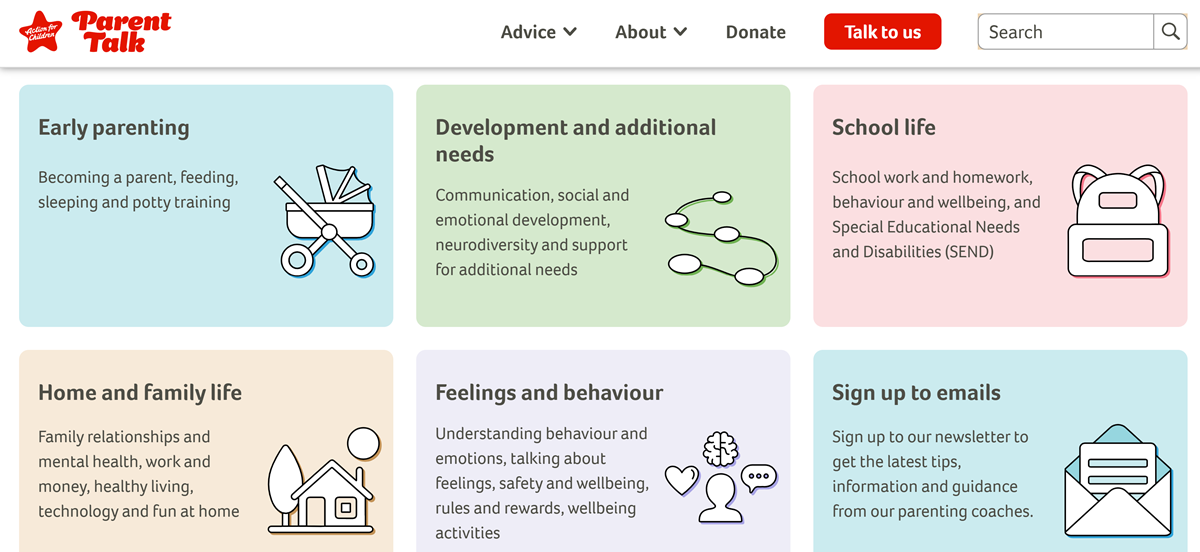Action for Children: Inclusive usability testing for Parent Talk’s digital support service
Discover how Nexer Digital partnered with Action for Children to run inclusive usability testing on their Parent Talk service, working directly with users of assistive technologies to validate accessibility, drive immediate improvements, and build internal research capability.

Action for Children is one of the UK’s biggest childrens charities, dedicated to supporting vulnerable children, young people, and their families. As part of their digital transformation efforts, they developed Parent Talk, a free, confidential online service offering expert advice and emotional support to parents and carers. Since its rapid re-launch during the COVID-19 pandemic, the service had grown significantly in reach and impact.
The challenge
Although the team had worked hard to make the Parent Talk platform accessible, they had never tested it directly with people using assistive technologies. They recognised the importance of validating their assumptions and understanding how real users experienced the service. To do this, they partnered with Nexer Digital to carry out a focused piece of inclusive usability testing.
Accessibility was a priority for the Parent Talk team, but the skills and experience needed to conduct this kind of research weren’t yet embedded in any one area. Rather than outsourcing the work entirely, the team saw the project as a learning opportunity. They wanted to collaborate closely with Nexer to validate Parent Talk’s accessibility and build their confidence in inclusive research practices.
The challenge was to deliver meaningful insights for Parent Talk while supporting internal capability-building in a way that felt collaborative and empowering.
What we did
To ensure the success of the usability sessions, we began with a light touch accessibility review of key areas of the Parent Talk service, including the homepage, advice content, and the live chat feature. This allowed us to identify and address any potential issues in advance, so that the sessions could focus on deeper usability insights rather than surface-level accessibility blockers.
We then ran three moderated usability sessions with participants who use a range of assistive technologies. These included a screen reader user (JAWs and NVDA), a participant with dyslexia and chronic pain conditions using Dragon NaturallySpeaking speech-input software and Speechify, and a mobile user relying on Apple VoiceOver. The sessions were a mixture of in-person, hosted in our usability lab in Macclesfield, and remote formats.
As this project was designed to be light-touch, we used a loose discussion guide that allowed for natural exploration. Participants were asked to think aloud as they navigated the service, helping us understand their behaviours, expectations, and any friction points. Rather than following a rigid task list, we encouraged participants to explore the areas identified in the expert review, which led to rich, contextual insights.
Deliverables and outcomes
The usability testing provided Action for Children with a clear, evidence-based view of how users with access needs experience the Parent Talk service. The final report included participant profiles, session observations, and prioritised recommendations, many of which aligned with improvements the team had already identified. These recommendations were designed to be practical and achievable within the roadmap.
Some of the more immediate changes were implemented during the project. For example, the initial expert review identified an issue with the navigation menu, which required users to cycle through every link to close it. This was corrected before the usability sessions and performed well in testing, demonstrating the value of early intervention and reinforcing the importance of inclusive design. The Parent Talk team had already undertaken desk research and were considering the removal of ReciteMe (a built-in accessibility overlay). The sessions provided extra insights around ReciteMe, and while some participants found it helpful, others experienced conflicts with their own assistive technologies. This led to a decision to remove the tool and instead focus on supporting users to engage with the service using their own preferred setups.
Throughout the project, the Action for Children team were active collaborators. Team members helped shape the work and shadowed the usability sessions to observe facilitation techniques and participant interactions. This hands-on approach helped build confidence and capability in inclusive research methods, which the team intends to apply to future work.
The project helped build momentum internally, sparked valuable conversations, and laid the groundwork for more inclusive design decisions going forward.

Working with Nexer to test Parent Talk with assistive tech users has given us an even better understanding of how we can make our service more accessible. As an agency, Nexer was great to work with - collaborative and flexible wherever possible to meet the project scope, while also providing opportunities for our team to learn along the way. The Parent Talk team are currently using the outcomes of the research to improve the accessibility of our service further, and we'll continue working on this over time. We'll also be sharing key learnings more widely within Action for Children
